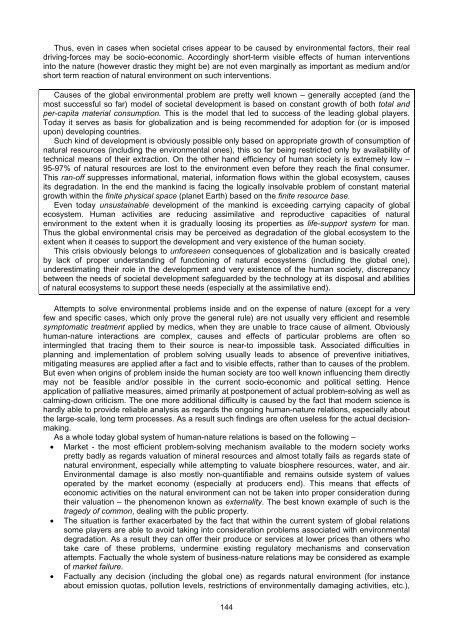Download - Center for Social Sciences
Download - Center for Social Sciences
Download - Center for Social Sciences
- No tags were found...
You also want an ePaper? Increase the reach of your titles
YUMPU automatically turns print PDFs into web optimized ePapers that Google loves.
Thus, even in cases when societal crises appear to be caused by environmental factors, their realdriving-<strong>for</strong>ces may be socio-economic. Accordingly short-term visible effects of human interventionsinto the nature (however drastic they might be) are not even marginally as important as medium and/orshort term reaction of natural environment on such interventions.Causes of the global environmental problem are pretty well known – generally accepted (and themost successful so far) model of societal development is based on constant growth of both total andper-capita material consumption. This is the model that led to success of the leading global players.Today it serves as basis <strong>for</strong> globalization and is being recommended <strong>for</strong> adoption <strong>for</strong> (or is imposedupon) developing countries.Such kind of development is obviously possible only based on appropriate growth of consumption ofnatural resources (including the environmental ones), this so far being restricted only by availability oftechnical means of their extraction. On the other hand efficiency of human society is extremely low –95-97% of natural resources are lost to the environment even be<strong>for</strong>e they reach the final consumer.This ran-off suppresses in<strong>for</strong>mational, material, in<strong>for</strong>mation flows within the global ecosystem, causesits degradation. In the end the mankind is facing the logically insolvable problem of constant materialgrowth within the finite physical space (planet Earth) based on the finite resource base.Even today unsustainable development of the mankind is exceeding carrying capacity of globalecosystem. Human activities are reducing assimilative and reproductive capacities of naturalenvironment to the extent when it is gradually loosing its properties as life-support system <strong>for</strong> man.Thus the global environmental crisis may be perceived as degradation of the global ecosystem to theextent when it ceases to support the development and very existence of the human society.This crisis obviously belongs to un<strong>for</strong>eseen consequences of globalization and is basically createdby lack of proper understanding of functioning of natural ecosystems (including the global one),underestimating their role in the development and very existence of the human society, discrepancybetween the needs of societal development safeguarded by the technology at its disposal and abilitiesof natural ecosystems to support these needs (especially at the assimilative end).Attempts to solve environmental problems inside and on the expense of nature (except <strong>for</strong> a veryfew and specific cases, which only prove the general rule) are not usually very efficient and resemblesymptomatic treatment applied by medics, when they are unable to trace cause of ailment. Obviouslyhuman-nature interactions are complex, causes and effects of particular problems are often sointermingled that tracing them to their source is near-to impossible task. Associated difficulties inplanning and implementation of problem solving usually leads to absence of preventive initiatives,mitigating measures are applied after a fact and to visible effects, rather than to causes of the problem.But even when origins of problem inside the human society are too well known influencing them directlymay not be feasible and/or possible in the current socio-economic and political setting. Henceapplication of palliative measures, aimed primarily at postponement of actual problem-solving as well ascalming-down criticism. The one more additional difficulty is caused by the fact that modern science ishardly able to provide reliable analysis as regards the ongoing human-nature relations, especially aboutthe large-scale, long term processes. As a result such findings are often useless <strong>for</strong> the actual decisionmaking.As a whole today global system of human-nature relations is based on the following –• Market - the most efficient problem-solving mechanism available to the modern society workspretty badly as regards valuation of mineral resources and almost totally fails as regards state ofnatural environment, especially while attempting to valuate biosphere resources, water, and air.Environmental damage is also mostly non-quantifiable and remains outside system of valuesoperated by the market economy (especially at producers end). This means that effects ofeconomic activities on the natural environment can not be taken into proper consideration duringtheir valuation – the phenomenon known as externality. The best known example of such is thetragedy of common, dealing with the public property.• The situation is farther exacerbated by the fact that within the current system of global relationssome players are able to avoid taking into consideration problems associated with environmentaldegradation. As a result they can offer their produce or services at lower prices than others whotake care of these problems, undermine existing regulatory mechanisms and conservationattempts. Factually the whole system of business-nature relations may be considered as exampleof market failure.• Factually any decision (including the global one) as regards natural environment (<strong>for</strong> instanceabout emission quotas, pollution levels, restrictions of environmentally damaging activities, etc.),144
















